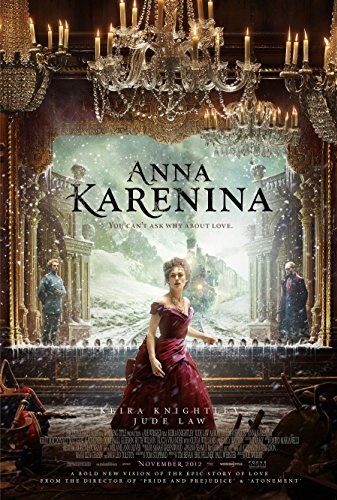
Ever since I read Tolstoy’s Anna Karenina years ago, I’ve been a fan of the lavish Imperial Russian romance. Like with any great piece of literature, I’ve found that I come to the story from a different perspective in each succeeding decade of my life. In my twenties, I found Anna and Vronsky’s doomed, passionate love affair extremely romantic, and Levin’s story a bit of a bore. In my thirties, I couldn’t forgive Anna for leaving her cherished son for a mere man, and took more interest in Levin’s philosophical musings. Now, I tend to see it as a fairly balanced view of the many forms of love that we human beings can experience. Anna, tragically, is merely a woman who falls in love under the wrong circumstances, while Levin seems to find the right balance between love and duty.
I’ve read the book quite a few times and have sought out the many movie adaptations (the good, the bad, and the ugly) over the years. I’ve seen the 1947 version with Vivien Leigh and Kieran Moore, the 1985 version with Jacqueline Bisset and Christopher Reeve, the 1997 version with Sophie Marceau and Sean Bean, and a 2000 BBC version with Helen McCrory and Kevin Kidd. It seemed to be about the right time for a new version, so I finally watched the 2012 film with Keira Knightly and Aaron Johnson.
At first, the setting of the film as an ever-changing stage scene felt strange and contrived; and there was an air of quirkiness that didn’t seem right to me, considering the thematic weight of the story. But after a while I got used to it, and the story settled into familiar Anna Karenina territory.
Keira Knightly won my heart as Elizabeth Bennett in Pride and Prejudice (no easy feat), and I liked her here as Anna. Though she always seems so young to me (who doesn’t these days?), in truth she’s probably a little older than the age Anna is supposed to be in the book, and I believed in her tortured portrayal as Anna.
When I first heard of the film and cast, I thought Jude Law was playing the dashing Count Vronsky, forgetting he’s now in his forties and too old for the role. Here he’s Anna’s dispassionate, regimented husband, Karenin. He does a fine job showing us Karenin’s distance, as well as his complete puzzlement at Anna’s betrayal.
Aaron Taylor-Johnson is perhaps the prettiest Vronsky I’ve ever seen on film, and is probably the closest to what Vronsky is supposed to be: young, dazzling, entitled, with the world as his oyster. Alicia Vikander is luminous as the sweet, innocent Kitty; and Domhnall Gleason (fast becoming one of my favorite character actors) pulls off Levin’s seriousness without turning him into the utter bore I saw in him all those years ago. Mathew MacFadyen plays Anna’s morally challenged brother Steva with apparent glee.

All in all, a young and glittering cast, gorgeous costumes, and a stirring soundtrack won me over despite my initial misgivings. If you’re a passionate Anna Karenina fan, you owe it to yourself to watch this film and give it a chance. It might even be my new favorite, beating out the 1997 version with the Bean. Okay, let’s not get crazy!